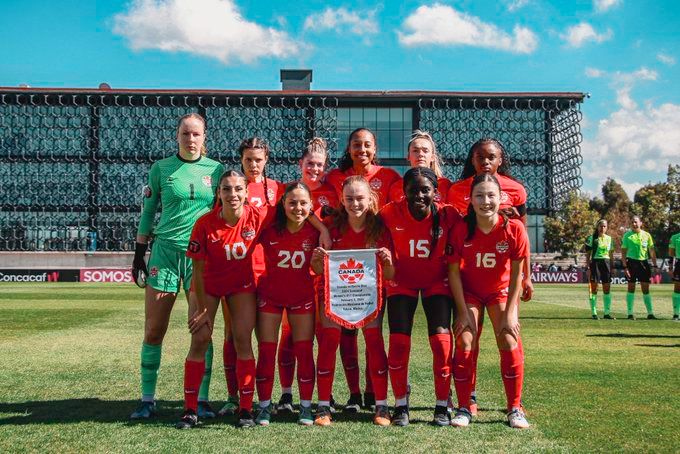GANGUE-RUZIC: CanWNT U-17s missing out on World Cup latest sign of worrying development trends

For the first time in their history, Canada’s Under-17 Women’s National Team will miss out on a U-17 FIFA Women's World Cup, having finished third at the 2024 Concacaf U-17 Women's Championship this past week, just short of a top two finish needed to qualify.
Prior to 2024, their third-place finish would’ve been enough to qualify – Canada also finished in third place in their previous three U-17 Concacaf Championships, making the World Cup off the back of each of those showings. But with the Dominican Republic hosting the next World Cup, the hosts locked up one of Concacaf’s three spots, removing the possibility of qualifying via a third-place finish.
And unfortunately for Canada, they were unable to make it to the final for the first time since 2013, as they came up just short in a 2-1 extra time loss to Mexico in their semi-final.
And it’s over - for the 1st time, the #CanW17 will miss out on the U17 World Cup, as they fall to Mexico
— Alexandre Gangué-Ruzic (@AlexGangueRuzic) February 9, 2024
Yet, this has been building. They haven’t made the final of the U17 Championship since 2013, and weren’t able to impose themselves vs the 🇺🇸 and 🇲🇽 in this tournament
As a result, Canada will have to sit on the sidelines for the first time since the U17 Women’s World Cup was launched in 2008, having previously participated in all seven tournaments that have been played to date.
For those who have followed Canada’s youth programs on the women’s side, however, this isn’t a surprising result, as they’ve been slipping for a while now.
For example, at the U20 level, Canada hasn’t won a World Cup game since 2014, losing all three of their games at the 2022 and 2016 tournaments, while missing out on the 2018 edition altogether. For a team that once made a final in 2002, it’s been a slow decline since, as they’ve made the quarter-finals just twice since that big run 22 years ago.
Then, at the U17 level, Canada has similarly struggled as of late, following up a record fourth-place finish at the 2018 World Cup before flaming out without a win in 2022 (the 2020 edition was skipped due to the pandemic), the first time they’d ever gone without a win in that tournament.
But that just further shows that Canada isn’t developing talent at the rate that it needs to be to compete at the youth levels in the women’s game, as teams around the world are catching up to them.
And, more worryingly, they’re now starting to lose their grip as a premier developmental team in Concacaf, too, with Mexico stepping up as the second-biggest talent producer beyond the US, who despite a slip in their global status as a top developmental team, still remain the biggest talent producer in Concacaf.
Yet, that’s not that surprising to see that a developmental gap exists between the US, Mexico, and Canada - the first two are home to the biggest domestic leagues in the region, while the latter remains without a professional league, one of just two teams at the latest World Cup without one.
❌ #canw17 lose 2:1 in the semis
— wsoccer.ca 💜 (@WsoccerCa) February 9, 2024
They do not qualify for the FIFA U17 World Cup this fall.
It wasn’t for lack effort, but the quality wasn’t there to grab hold of this game.
Cue the “our development system is broken” discourse. https://t.co/hTZGjdjUwG
That’s a huge advantage - for example, one of the US’s goalscorers in their 5-0 win over Canada this tournament already has pro minutes in the NWSL (Melanie Barcenas), and one of the others has already signed a professional deal at 15 (Alex Pfeiffer).
Meanwhile, most of Canada’s top players' main competition comes a few months each year when they get to play University-aged level talent in League 1 Canada, which despite being a strong level, doesn’t compare to a professional environment, especially not when the season is so short due to the collegiate commitments of those university-age players.
Of course, none of this is new - there’s a reason why there have been several calls to create a professional league in Canada, an endeavour that Project 8 Sports is undertaking, slated to kick off next year - if successful, that could fill that gap in a big way.
But while that could help finally bridge that gap that is being created between Canada and countries with leagues that provide those platforms for top U20 players to play professionally, that leads to the second big problem that cropped up at this tournament - Canada’s lack of style of play at the youth level.
For example, against Mexico, Canada spent most of the game pumping long passes up the pitch, which given that Mexico was playing a high defensive line with a sweeper keeper, ended up proving to be a mostly futile exercise, playing into that defensive strategy they employed.
Instead of varying that attacking strategy with a short passing game, which could’ve helped draw Mexico out of position to then play that killer pass, Canada kept making life easier for Mexico’s defence with their decision to try and go for that killer pass right away.
To be fair, it can be argued that this could be a natural byproduct of the fact that this team didn’t get much preparation time, as Canada were only able to put together one camp before the tournament to help prepare, which certainly couldn’t have helped in their ability to build a tactical plan and develop chemistry.
At the same time, given that the players in this U17 squad were selected from just three teams, CF Montréal’s CDN, Ontario’s NDC and the Vancouver Whitecaps REX program, one would’ve imagined that the familiarity players would’ve had in their club environments could’ve overcome that.
Yet, despite being able to pick from groups of players quite familiar with each other, that familiarity wasn’t able to be demonstrated, as Canada were unable to replicate the things that the players do with their clubs. For example, when the Whitecaps and Montréal’s teams met at the interprovincial championships last year, it was a high-paced game where both teams tried to dominate possession, playing a ball-dominant, short passing game, a style that Ontario also tries to emulate.
Because of that, it was surprising to not see that game model in place during this tournament, as it often seemed like the players weren’t always comfortable with how direct they were playing against the US and Mexico, which left them prone to some dangerous turnovers and transition moments in those games.
For what it’s worth, though, there are still lots of positives to take away from this tournament, even if Canada missed out on the World Cup.
At the end of the day, while results will dominate discussions in situations like this, the big goal for Canada will be to eventually produce talent that can help out the senior team, and that can still most definitely happen despite the results.
Of course, it might help some players to get those opportunities to win trophies and play in World Cups, as those sorts of showcases can help long-term development, but at the end of the day, the cream always rises to the top.
And in that regard, Canada can be encouraged with a few players from this tournament.
First, Annabelle Chukwu proved that she can dominate her peers, as after having already scored at the U20 levels and earning a senior call-up, she didn’t turn down her nose at a chance to captain the U17 team, scoring five goals in this tournament. Given that she was a key piece on the U20 team that qualified for the World Cup last year, scoring four goals in the U20 Concacaf Championships, expect her to have a big U20 World Cup this year.
Annabelle Chukwu finds the back of the net equalizing the score at 1-1 for Canada! 🇨🇦⚽ pic.twitter.com/jm7VLB1Ze2
— Concacaf W (@ConcacafW) February 9, 2024
Then, Kaylee Hunter built off a strong season for the Whitecaps, in which she scored some big goals en route to a huge trophy-winning year, as she found the net an impressive four times across five games in this tournament.

Otherwise, Noelle Henning had some great showings in goal against the US and Mexico, keeping Canada in both of those respective games with some big stops, as she looks to become the next name in a long line of successful Canadian goalkeepers that have played for the senior team.
Along with positive contributions from the likes of Isabelle Chukwu (when healthy), Alyssa McLeod (who is just 13 years old!), and Keira Martin, there are plenty of players who will look to first push into the U20 squad for the U20 World Cup later this year, before then trying to jump up to the senior team.
And ultimately, that’ll be the goal. Ideally, Canada will begin competing at the U17 level more regularly long-term thanks to the creation of a league, but the goal will remain to get players developed to play at higher levels, and there are still several players who showed that they can do that in this tournament.

